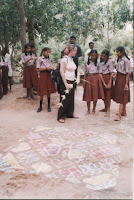 With only two weeks left on the Subcontinent, I'm starting to dread our imminent departure. After the shock of the first week, I quickly fell into the rhythms of the Subcontinent: I am a salwar-kameeze-wearing, jasmine-beflowered, toe-ringed, namaste-greeting, puja-attending, tanned begum. Sometimes I don't even need raita to cool down my food. and Kingfisher...Budweiser will never taste the same again. I am still puzzling over much of Indian existence (still I wonder: Why no garbage collection? Lack of traffic laws, however, I have no problem with), but for the most part I feel settled.
With only two weeks left on the Subcontinent, I'm starting to dread our imminent departure. After the shock of the first week, I quickly fell into the rhythms of the Subcontinent: I am a salwar-kameeze-wearing, jasmine-beflowered, toe-ringed, namaste-greeting, puja-attending, tanned begum. Sometimes I don't even need raita to cool down my food. and Kingfisher...Budweiser will never taste the same again. I am still puzzling over much of Indian existence (still I wonder: Why no garbage collection? Lack of traffic laws, however, I have no problem with), but for the most part I feel settled.We're currently in South India, which is a mellow, friendly, tropical place. After twenty days in the north (I have some great photos of the Kama Stra carvings on the temples at Khajuraho...some prove that horses really can be man's best friend), we returned to Delhi, which was very comforting. After the squalor of Bhopal (remember the Union Carbide disaster? We were in the middle of it) and the historical/religious sites of Orccha, Sanchi, and Khajuraho (all so peaceful and perfect), Delhi was so familiar and (gasp!) calm. I understand now why Sally started us there with a full week of acclimation. After traveling through Madhya Pradesh, though, the Western styles of Delhi were a shock: jeans? sleeveless shirts? Domino's pizza? Where are the saris and paneer?!

After home sweet home (aka Delhi), we flew down to Chennai (Madras), which is a surprisingly trendy--if polluted--city. We shopped ourselves sick in Chennai. After days spent in school watching little kids dance like monkeys and older kids sing about the four things that bind all of humanity (apparently, that's health, hygiene, world peace, and music...I love india), we spent our evenings dining in swank colonial hotels and buying out Fab India. I own more kurtas now than I know what to do with. Unfortunately, we had our first battle with bed bugs. I fell victim pretty early, although I was spared the cockroach sightings of other rooms. At least there were good dosai and coffee downstairs. The one shock of the south is that there's very little alcohol consumption, so after a long day at school, Ben and I would go on Kingfisher hunts through shady Chennai streets. We finally found a bottle shop, but it was a scene: the shop is behind bars, and you slide your money under the bars; the owner then unlocks the cage to come outside with your newspaper-wrapped, brown-bagged beer. And when you unwrap the bottles, a large label reads, "Liquor ruins country, family, life." Still we drank it.
 The past week, however, has been really mellow. We were enjoying downtime at the Ideal Beach Resort in Mahabalipuram on the Bay of Bengal. "Relaxation" meant beach-side guitar singing, body surfing in eight-foot breakers, taking a tiny fishing skiff into the sea to swim with jellyfish, reading a lot, swimming laps, watching traditional dance performances, and skinny dipping. Our group was the talk of the resort. Every day, we managed to break at least one rule (who knew you weren't allowed to swim in the ocean at night?).
The past week, however, has been really mellow. We were enjoying downtime at the Ideal Beach Resort in Mahabalipuram on the Bay of Bengal. "Relaxation" meant beach-side guitar singing, body surfing in eight-foot breakers, taking a tiny fishing skiff into the sea to swim with jellyfish, reading a lot, swimming laps, watching traditional dance performances, and skinny dipping. Our group was the talk of the resort. Every day, we managed to break at least one rule (who knew you weren't allowed to swim in the ocean at night?). It's a shock to the system to be back in urban India, sightseeing and being edified by local professors. But we're now on the temple- and literature-focused part of the trip. I finally saw a temple elephant today at Meenakshi Temple; it blessed Rachel. I've been told that I must be an avatar of Meenakshi, what with my name somehow related to her, the lotus flowers in my hair, my "fish-eyed" glasses, and the leaf parrot attached to my bag. Every day it becomes clearer and clearer that I am an Indian deity.
It's a shock to the system to be back in urban India, sightseeing and being edified by local professors. But we're now on the temple- and literature-focused part of the trip. I finally saw a temple elephant today at Meenakshi Temple; it blessed Rachel. I've been told that I must be an avatar of Meenakshi, what with my name somehow related to her, the lotus flowers in my hair, my "fish-eyed" glasses, and the leaf parrot attached to my bag. Every day it becomes clearer and clearer that I am an Indian deity.Well, we're off to the Gandhi Museum now. Mostly I am excited for the elephant that lives next door. We definitely haven't seen enough wildlife...monkeys have yet to steal a coconut out of my hand!







